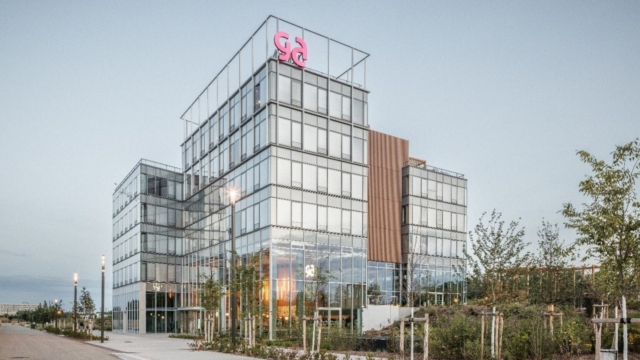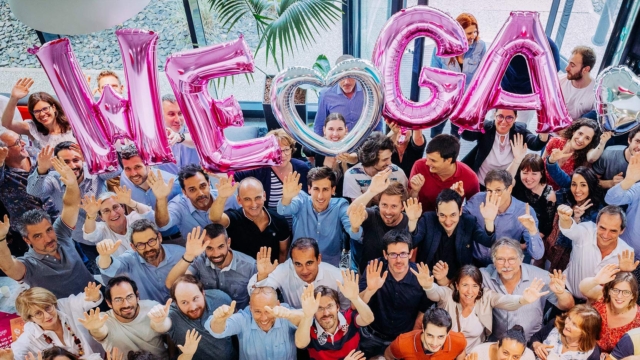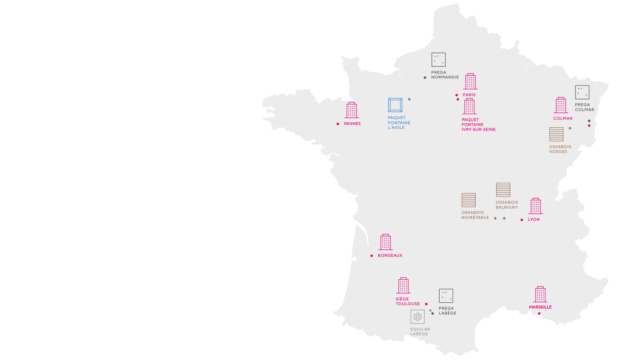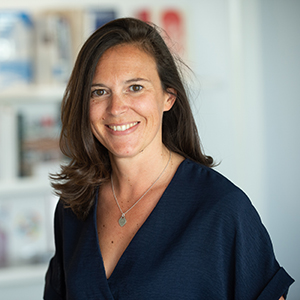At GA Smart Building, sustainable construction is a shared responsibility, carried out daily by the men and women of our Group.
We believe that real estate can—and must—be a driver of transformation. For the climate. For resources. For quality of life.
Together, we design and build buildings that serve their users and anticipate the major challenges of tomorrow.
This commitment runs through our entire value chain, from design to operation, from the materials we choose to the way we work.
A strong environmental commitment to sustainable construction
Sustainable construction aims to reduce the environmental impact of buildings throughout their entire lifecycle, from design to demolition, by prioritizing responsible materials, low-carbon processes, and high energy performance.
At GA Smart Building, sustainable construction is not a promise for the future. It is a concrete reality, deeply embedded in how we design, produce, build, and renovate—something we’ve been doing for many years.
Our off-site construction model, our innovation choices, and our environmental governance reflect a consistent and ambitious goal: to reduce our carbon footprint as much as possible, preserve resources, and create intelligent, high-performance buildings.
Integrated R&D to build differently
Innovation is part of our DNA.
Each year, we invest €2 million in the research and development of innovative, competitive, integrated, and off-site technological solutions that combine energy and environmental performance with user comfort.
Our most recent example: our PREGA factories are developing ultra-low carbon concrete formulations aiming for a 70% reduction in greenhouse gas emissions compared to traditional concrete.
A structured climate strategy, validated by the SBTi
Mitigating climate change is a strategic imperative in our sector. At GA Smart Building, we have made it the core of a structured climate strategy built around measurable goals, concrete action plans, and rigorous monitoring.
Since 2022, we have taken the initiative to conduct our greenhouse gas (GHG) emissions inventory annually—even though regulations only require it every four years.
This strategy is brought to life through our CAP2030 action plan, structured around six pillars:
- Development of decarbonized solutions
- Preservation of natural resources
- Strengthening of carbon accounting reliability
- Decarbonization of Group mobility
- Diversification of low-carbon activities
- Skills development to achieve environmental excellence
In 2024, our strategy was recognized by the Science Based Targets initiative (SBTi), which validated our reduction targets aligned with a 1.5°C warming scenario—the most stringent global standard:
- 55% absolute reduction in scopes 1 and 2 emissions by 2030
- 55% reduction in scope 3 emissions in physical intensity (kgCO₂e/m² delivered)
Innovating to decarbonize
Reducing the carbon footprint of our buildings is not just one goal among others—it is a central requirement guiding our industrial, technical, and architectural choices.
At GA Smart Building, we believe that every design decision matters, from choosing:
- The right construction method for the right location: post-and-beam, timber frame, 3D modular…
- To the right material in the right place: low-carbon concrete formulated in our factories, wood from sustainable sources implemented by Ossabois, wood/concrete hybrid systems…
Decarbonizing a building also means planning for its long-term performance. With our Equilab teams, we design AI-powered solutions that limit operational carbon impact, while adjusting user comfort and anticipating regulatory changes.
Additionally, GA Services, our property management entity, oversees the management and performance of properties within its portfolio, whether or not they were designed by the Group.
From design to construction to operation, we invest in the digital transformation of our professions and projects—especially through the deployment of FullBIM. We also integrate data use and digital access to services in all our offerings.
A holistic approach to resources and living systems
We believe that sustainable construction requires full control of all environmental impacts related to our activities.
Water conservation on our industrial sites and factories, soil de-sealing, ecosystem protection to preserve and enhance biodiversity, systematic material reuse as part of a circular economy, waste reduction—our off-site construction approach supports all these goals.
Social commitment as a driver of responsibility and impact
Our strong social commitment reinforces the consistency of our model.
Employee safety is a top priority—on our construction sites, in our factories, and in our offices. Risk prevention, health protection, and instilling a shared culture of vigilance guide us daily.
We also act to promote diversity, equal opportunity, and inclusion for people with disabilities, through a structured action plan. Our involvement with the Cercle des Femmes de l’Immobilier, including signing the Charter for Gender Parity and Professional Equality in Real Estate Companies and Organizations, is one example.
Our corporate culture is built around well-being, recognition, and balance, offering a meaningful and stimulating work environment. This is reflected in concrete actions: promoting workplace sports, supporting work-life balance, and integrating art into our spaces.
Finally, our majority employee shareholding model—60% of the capital has been held by employees since 2017—is our strength and our distinction. It strengthens trust and commitment to the shared future of a positive, visionary, and responsible company that contributes to the development of the territories in which it operates.
Social responsibility: extending our impact
Our responsibility does not end with the buildings we design.
At GA Smart Building, we also act to extend our impact beyond our projects, by contributing to a more inclusive, more supportive, and more sustainable society.
Our philanthropic policy reflects this approach. It is built around three clear priorities: imagining the city of tomorrow, fighting poverty, and supporting all forms of disability.
We also pursue a responsible procurement policy, integrating social and environmental criteria into our purchasing decisions, and prioritizing local supply chains and long-term relationships with our partners whenever possible.
We actively contribute to the activities of the Observatoire de l’Immobilier Durable (OID), an independent association aimed at accelerating the ecological transition of the real estate sector in France and internationally. This commitment reflects our desire to play an active role in transforming our industry, by helping make buildings more resilient, more sustainable, and aligned with the most demanding sustainability standards.
Finally, our local presence is reflected in concrete commitments alongside public authorities, economic stakeholders, and local associations.
Measuring our progress and strengthening our standards
Our sustainability strategy is based on measurement, transparency, and continuous improvement.
Because credibility requires evidence, we have chosen to structure our approach around concrete and recognized indicators.
Since 2020, our social responsibility performance has been assessed by EcoVadis, a global reference platform that analyzes corporate practices across four key themes: environment, social & human rights, ethics, and responsible purchasing. In 2024, we were awarded the Platinum medal, placing us among the top 1% of companies assessed worldwide.
For several years, we have also published our annual Non-Financial Performance Statement (DPEF). This report outlines all the actions we take to integrate environmental, social, and societal issues at the core of our business.
Beyond regulatory obligations, we have chosen to include an analysis of alignment with the European taxonomy. This rigorous framework enables objective measurement and comparison of the environmental performance of our projects. As early as 2022, we set a clear goal: to achieve 100% alignment of our projects by 2030. In 2024, 82.7% of the revenue generated by our development, construction, and renovation operations is already aligned, representing 63.5% of the Group’s total revenue. Furthermore, over 50% of our investments (CAPEX) are considered aligned.
What we document each year reflects a deep conviction: a sustainable construction strategy only makes sense if it is long-term, measurable, and shareable.
Flagship Projects Serving Sustainable Construction
Our commitment to sustainable construction comes to life in the projects we carry out, whether for new buildings or ambitious renovations. Every project is an opportunity to implement our off-site solutions and our environmental standards.
In Poissy, Stellantis’s grEEn-campus embodies a new generation of resilient, technically efficient buildings designed for carbon-neutral operations. In Toulouse, 1pulsion anticipates the future of office spaces, with local off-site construction, a low-carbon worksite, and a user-centered approach.
In the Paris region, projects such as Tempo for PAREF, the renovation and extension for Osesam, and the renovation of CNES headquarters showcase our ability to transform existing buildings to meet high environmental standards: ambitious certifications, energy upgrades, and enhanced biodiversity.
In Saint-Cyr-l’École and Tours, our commitment to timber construction, in partnership with Ossabois, takes shape in 100% off-site housing projects, certified biosourced and designed according to the highest standards of use, air quality, and carbon footprint.
Lastly, commercial projects such as the IDEMIA factory in Vitré or the building D of the NOW Campus demonstrate that sustainable construction can be applied across all types of buildings, combining high environmental performance, user comfort, and technological innovation.




